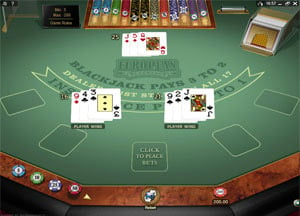Should I play more than one hand in Blackjack?
With online casinos now offering multi-hand blackjack games, you'll often find players playing two or more hands of blackjack simultaneously instead of the standard single hand. At land based venues, you'll find the same.
You may also find players suddenly changing from one hand to two mid shoe in an attempt to "change the flow of the cards" as they mistakenly believe that this will "change their luck" at the tables. Unfortunately this is another blackjack myth as you are just as likely to continue losing as you are to begin winning during any given hand, so changing your game play from a single hand to two or more will not guarantee anything.
Obviously, the more hands you play simultaneously, the more hands you'll play per hour and while this may seem like you're getting more game play and having more fun, it generally isn't the best way to play blackjack. This is due to the fact that even when playing according to perfect strategy, the house still has the edge, and that means that you'll be exposing your casino bankroll to more risk, ultimately losing more money.
That said, let's consider a scenario wherein you play two hands but instead of betting $20 on a single hand, you split the value and bet $10 on each hand. If you play 100 hands per hour, your theoretical loss on a single hand when wagering $20 is around $10. When betting $10 per hand on two hands, you will decrease your theoretical loss to $8 per house (assuming you play 160 hands per hour - 80 hands per spot). This means that you can decrease your hourly loss if you spread your bankroll across two hands.
If however you bet $20 on each of your two hands equating to a total bet of $40, the amount you wager per hour will be greater than if you bet just $20 on a single hand and this means that your theoretical loss will increase, making this betting pattern a risky one for those on a limited bankroll.
Now it may seem like the swings in your bankroll would remain the same whether you wager $50 per hand or $25 on two hands since the amount you bet is the same (ie $50). This however is not the case as your two hands are dependent on the dealer's hand and if he/she has a bad hand you're likely to win both hands and vice versa if the dealer has a strong hand. Practically speaking, this means that your bankroll will fluctuate less when you bet $25 per hand on two hands than it would if you were to wager $50 on a single hand.
The majority of blackjack players enjoy a game wherein they can stretch their bankroll to accommodate a reasonable session at the blackjack table, others aim to achieve a predefined win goal - for example winning $150 with a $300 bankroll. A common question for these players is whether playing more than a single hand will help them to achieve their objective.
According to blackjack experts who have run simulations using a $300 bankroll to determine whether a player would survive a 3 hour session or achieve a $150 win rate, the answers are as follows:
- When players bet the same total amount per hand, wagering on two hands improved their chances of their casino bankroll's lasting three hours but lowered the likelihood of these players winning $150.
- By increasing the total value of their bet per hand from $10 to $20, their odds of winning $150 increased, but the chances of their bankroll lasting 3 hours decreased.
So it can be concluded that you can't have everything. If you play multiple hands, betting half as much as you would on a single hand on each, you will experience fewer fluctuations in your casino bankroll and you'll enjoy a longer session BUT you will probably not achieve the win total you set out to. It all depends on what is most important to you as a player.


